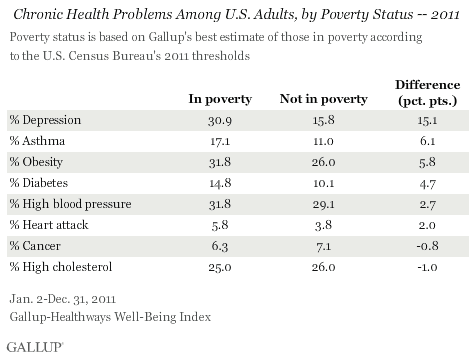Study: People Living in Poverty Are Twice as Likely to Be Depressed
How chronic illness, lifestyle, and access to care differs above and below the poverty line

This morning's Study of The Day is actually a poll, in which The Gallup-Healthways Well-Being Index conducted with a random phone-interview sample of U.S. adults and looked at the prevalence of chronic illnesses.
They found a variety of chronic health problems disproportionately affecting the poor, with the incidence of depression showing the strongest disparity: 31 percent of Americans under the U.S. Census Bureau's poverty threshold in 2011 had been diagnosed with the disorder, as opposed to 15.8 percent of those not in poverty:

The increased rates of asthma, diabetes, high blood pressure, and heart attacks likely come along with the heightened levels of obesity among this group, and with the fact that this demographic is much more likely to be smokers.
It's a small difference, but cancer rates were actually 0.8 points lower for those in poverty, and the same group was less frequently diagnosed with high cholesterol as well. Salient here, of course, is that the poll surveyed diagnoses -- these are both conditions that may go symptomless, and so it is quite possible that the numbers seen here are a reflection of reduced access to testing and routine medical care. As another line of questioning revealed, adults living in poverty had more difficulty attaining basic health necessities like insurance or access to a personal physician. Those in poverty reported having more trouble affording medicine and, to a surprisingly large extent, even being able to access medication in the area in which they live.
- Chocolate Works Like Morphine on the Brain
- People Who Wait to Have Sex Are 'Less Dissatisfied' in Marriage
- Even Forced Smiles Genuinely Decrease Stress
Other findings were less intuitive. There was almost no difference, for example, in the percentages of both groups who reported having eaten healthy the previous day (about 65 percent). Of course, "healthy" was left up to personal interpretation; in a more objective measure of healthy habits, those not in poverty were more likely have consumed five or more servings of fruits and vegetables, four or more days per week. But those in poverty were also less able to access fresh fruits and vegetables or find a safe place to exercise.
The high rates of depression are discouraging for all Americans, but the pollsters explain that they are unable to determine why the percentage of diagnoses doubled among the poor. Poverty may well be a causative agent of depression, but the opposite can be true as well, and the other lifestyle and disease factors revealed here may also contribute to depression's overrepresentation here. Overdiagnosis, in this case, should also not be discounted -- results like these are interpreted by some as revealing more about the conditions of poverty than individuals' mental health.
